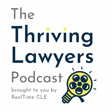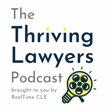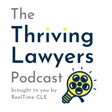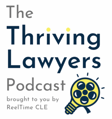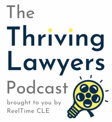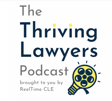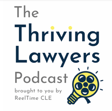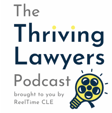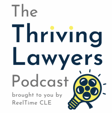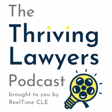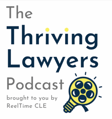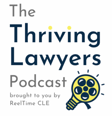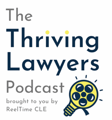Become a Creator today!Start creating today - Share your story with the world!
Start for free
00:00:00
00:00:01

Elisabeth Steele, JD, Virtual Video Vitality Virtuoso
Transcript
Webcam Technology & Skin Tone Challenges
00:00:03
Speaker
most webcam technology was tested on white people or people who don't have melanated skin. And so there are those of us who have to struggle with our webcams to get them to kind of capture us in a way that feels accurate.
Introduction: Michael Kahn & Elizabeth Steele
00:00:22
Speaker
Welcome back to The Thriving Lawyers Podcast. In this week's episode, join Michael Kahn for a discussion with Elizabeth Steele, who teaches educators and lawyer types to connect with virtual audiences. Michael and Elizabeth also discuss her DEI work. Welcome back everybody to The Thriving Lawyers Podcast. This is Michael Kahn.
Michael Kahn: Law to Psychotherapy Transition
00:00:44
Speaker
former lawyer and a Currently a psychotherapist and I do a couple days a week with the lawyer assistance program at British Columbia half of Half of real-time creative learning experiences Chris Osborne is my partner. I'm not sure how often I need to do this intro Now that we've been podcasting for all these years, but I'm assuming we have new listeners all the time So forgive me for those who?
00:01:14
Speaker
listen more than once, and thank you for those of you who come back and listen. I appreciate it. So we have a wonderful guest and individual and someone I'm getting to know more and more, and I'm getting to see her. We're not recording video, but we are recording audio, but I get to see her and her wonderful smile.
Elizabeth Steele: Educator & Legal Specialist
00:01:38
Speaker
And she is in Hawaii. That's where she lives, in Honolulu, Hawaii.
00:01:42
Speaker
or I am going to in a couple of weeks, so I'm very excited. But Elizabeth Steele is our guest today, and she is with Elizabeth Steele, LLC. And I'll tell you a little bit about her, but I'll let Elizabeth fill in some of the gaps I'm sure that I'm gonna leave here. But she has been, she's a JD.
00:02:06
Speaker
She has not, she never practiced, but she can talk about that with you. She's been an educator and an instructor for more than 15 years. She, since 2009, has specialized in legal audiences, presenting, coaching, and providing feedback to law professors, attorneys, pre-law advisors, and law school applicants.
00:02:28
Speaker
She's also led committees of attorneys and law school faculty on topics ranging from bias and racism to online destruction. You're probably glad, Elizabeth, I'm not writing your text for your website. In fact, Elizabeth and I are on the Equity, Diversity and Inclusion Committee.
Elizabeth Steele: DEI Involvement & Government Work
00:02:54
Speaker
for the Association of Continuing Legal Education. And we'll talk, we'll definitely go into the topics of bias and racism. She's worked for the White House and FEMA. And she also is a faculty specialist with the University of Hawaii at Manoa. I think I said that right, Elizabeth.
00:03:21
Speaker
And she's a lecturer-in-law at UHM, William S. Richardson School of Law, and a member of UHM's Commission on Racism and Bias, and a board member of the Law School Transparency Board.
00:03:38
Speaker
And I will leave it at that. There's more to mine there, I'm sure. But Elizabeth, please welcome and please correct me anywhere where I was off or share anything, expand on anything that I said in your introduction.
Elizabeth's Background & Life in Hawaii
00:03:56
Speaker
Will do. Thank you so much for having me. I'm thrilled to be here. Great. I am originally from College Park, Maryland in Prince George's County and have been living in Hawaii for
00:04:08
Speaker
Oh my gosh, I think it's coming up on 16 or 17 years. I'm a long term visitor here and I am thrilled to know you. Thank you, thank you. I'm sure you, you must...
00:04:22
Speaker
To the point maybe of being sick of it, when you say you live in Hawaii, people's reaction are, oh my gosh, you live in paradise. Actually, I do get that reaction when I say I live in Vancouver too. It's certainly not the same weather here, but I feel fortunate to be having lived here in Vancouver for almost eight years, and I'm sure you feel the same about living in Hawaii for 16 years.
00:04:48
Speaker
It's gorgeous. I think the physical beauty of the place is astounding. And I think like any other place, there are challenges here that are unique to being on an island. And for me, it's been a wonderful experience. My mother actually lived here until she was five. And her mother was what we call Kama Ina, born and raised on the island.
00:05:17
Speaker
You know, I am certainly not from here. I would never kind of claim this as my home, but it is the place that I have been very fortunate to live and develop friendships. And I adore my colleagues and it's been an adventure and I'm very glad for it.
00:05:38
Speaker
Yeah, yeah.
Virtual Engagement & Education Techniques
00:05:41
Speaker
Speaking of thriving, Oahu or one of the other islands in Hawaii is not a bad place to be considering the resources you have there in terms of the outdoors and the beauty that's just right at your fingertips there. And as you say, and it's truly up here in Vancouver too, there are certainly, it's not paradise, there are certainly issues.
00:06:08
Speaker
that we have, but to be able to have such access to the outdoors, I think is such so good for our, and we're gonna talk about wellbeing as we move forward in the conversation. So, something else, I'll say something else from Elizabeth's or quote her website too, because I think this really describes what she does in one sentence.
00:06:33
Speaker
Elizabeth teaches educators and lawyer types to connect with virtual audiences. I think that describes well what she does and I'm curious to hear more about it and to hear about your business and to hear about how you, what you do
00:06:52
Speaker
For your own well-being and then we'll talk a little bit about diversity and bias to this will be a. Free flowing conversation so why don't you say a little bit more about about your business was the thumb i'm very intrigued with it sure so i wasn't.
00:07:11
Speaker
before I feel like it's the before times, before COVID and quarantine. I had developed and taught online courses here at the University of Hawaii at Manoa for Women's Studies program.
00:07:32
Speaker
It was an amazing experience. I loved the classroom and I was really intrigued about how teaching online might differ from my experience with face to face.
00:07:42
Speaker
teaching and I was kind of an early adopter on our campus and when it became clear that we were going to not be able to offer in-person classes for safety reasons here at the William S. Richardson School of Law, our dean asked me to step up and to lead our faculty efforts to
00:08:04
Speaker
I think we called it readiness for online instruction. I was one of the few folks who had had a teaching background, a teaching online, and it was an extraordinarily exciting, challenging, rewarding experience. We put together professional development opportunities for many of our law school instructors who had never themselves been in an online class, much less
Inclusive Video Communication & On-Camera Skills
00:08:29
Speaker
taught an online class.
00:08:30
Speaker
And in the process of doing that, I discovered there was quite a need among law school faculty and attorneys to kind of figure out how do we take advantage of this medium, right, which we didn't choose. Not many of us, you know, many of us are mid-career, late-career, and this was not, would not have chosen this if I knew I had to be teaching online.
00:08:51
Speaker
And I realized that I could pull from experiences that I had as a law student working at the White House, having had press training.
00:09:01
Speaker
my experience in community theater. I mean, all of these things, you know, my own interest in cinema. And so it was, you know, I realized how funny is it that I am kind of positioned to actually be helpful to my colleagues to get them kind of over this hump. And so, you know, it's been a wonderful adventure. I've been able to meet people like you, people I've never met with in person that I feel connected to. And then what I've tried to do is really, someone just called me a video evangelist the other day.
00:09:29
Speaker
which I thought was great. The idea that it is possible for all of us to connect using video. And what that means is capturing each other's attention, being respectful, figuring out and developing what I would call inclusive or community-based norms for how we're going to use video in our educational institutions and our businesses and the practice of law.
00:09:56
Speaker
And it's just a lot of good fun, I think. And so thanks for giving me the opportunity to describe it because during my day, my day job is I'm a pedagogical coach. So I work with college and university instructors here about how to develop relationships with their students. And so in kind of this passion project, I'm continuing to do that primarily for lawyer types.
00:10:25
Speaker
Wow, okay, there's a lot you said that I need to, the interviewer's quandary, which we're at direction to go, there's so many. You mentioned, I mean, some things that if I were listening to this podcast that would get my interest would be, you said you're a movie person. You also said that, well, you work for the White House, so I'm very interested
00:10:55
Speaker
to hear about that. But say a little bit more about your business. People would come to you and they'd consult with you in terms of how to present better online. Absolutely, absolutely.
00:11:14
Speaker
Most of my work that I do is for organizations. For example, a bar association will help me come in. A law firm, a law school would hire me to come in and provide some on-camera skills training for their staff. It's a ton of fun. I've also been hired to do
00:11:35
Speaker
to focus on law teaching online, asynchronous and synchronous best practices to engage law students. I've done things like, it's been fantastic. A client challenged me and said, do you think you could help us set up a kind of a Zoom interview studio for our students who are preparing for on-campus interviews? And I was like, yes, I believe that I can do that.
00:11:59
Speaker
I have a ton of fun. It's kind of soup to nuts. It's everything from, it's all, everything I teach is geared towards connecting, right? Creating connection and rather than kind of perfection, the idea that everything, every hair has to be in place and you have to have it. But it's really kind of letting people know, you know, there are some things that we could all do differently to kind of elevate our online presence, to emulate the folks that we kind of see in broadcast news. We have all been,
00:12:26
Speaker
One of my favorite movies, by the way. I do, I do. I appreciate it. You probably like that scene where he gets pointers on how to sit on his jacket. His shoulders don't, the shoulders of his suit don't bunch up. It's exactly what I do. I collect all of these little tidbits and then break them down for very busy, very harried layers.
00:12:52
Speaker
And I think, but my claim of claim to fame is that people walk away thinking, oh my gosh, that was actually useful. I think my number one comment is people saying, I had, I didn't know what to expect. And it was, I had learned so much and I'm going to use this immediately in my blog practice. And that to me, that makes me feel like, okay, great. High five, high five. I have to share, I have to share a couple of the quotes on your website. She's got a great website, by the way. Thank you.
00:13:19
Speaker
You cannot help but learn and laugh when you're working with Elizabeth. She is a rock star of screens, big and small. And then the other one is I've had around 11, I love this. I've had around 110000 virtual meetings over the past year and thought I was an old hand at using the tools.
Impact of COVID on Virtual Presentation Demand
00:13:39
Speaker
I was wrong. This is great. So those are great quotes. So did you,
00:13:47
Speaker
You were doing this before COVID, but did COVID kind of just speed up this whole process for you? I mean, I probably should ask that question rhetorically. I assume it has. It's absolutely been, I think, a response to COVID that folks have come to me and asked. It's been fantastic. I count among my clients that one of the top
00:14:12
Speaker
25 largest school districts in the United States and, you know, fantastic law schools and other folks who realize that this is, that I can offer kind of an expertise that is, that is imminently practical for folks. That people don't know they need according to that one, that one review, right?
00:14:32
Speaker
I think that sometimes folks will come to me and say, Oh my gosh, I hadn't even thought about this. And you help me think about it in a different way. And that is just super gratifying because what I, my goal is that everybody feels more comfortable, kind of what I like to say, rock your box, right? Figure out how do you, how do you think about ourselves as in terms of presenting ourselves? You know, what did it, how, what do we want to communicate? And I think many of us, you know, have,
00:14:56
Speaker
long that used to kind of thinking about, let's say, inviting folks into a psychotherapist's office and you think about how you've kind of appointed your space. What do you want a message? What feeling do you want people to have? And we do that in, you know, law firm lobbies and conference rooms, right? But now we have to think about what I invite people to think about is how to do that in a different way. And it turns out that
00:15:21
Speaker
It doesn't cost anything to apply these, for most part, it doesn't cost anything to apply these lessons from cinematographers.
00:15:32
Speaker
journalists, right, that really figured out how to do this. And so I like to apply that to kind of real life situations. So here's an example that I know that folks can't see us who are listening in, but imagine that you are in your Zoom box. I invite people if they have four fingers to extend them. And so the other way to do this is kind of make the letter B in American Sign Language.
00:15:55
Speaker
and then place it on the top of your head. The idea is that the top of your pinky should be at the very top of your frame. So this should be about four fingers width between the top of your head and the top of your zoom box. And when we assume that kind of that position that I call it a broadcasting posture, right?
00:16:17
Speaker
We look more like Joy Ann Reed. We look more like, you know, Trevor Noah. That's kind of the standard for setting ourselves up in our box. Interesting.
00:16:29
Speaker
Is it important? Is it necessary? Is it wrong to not do it? No, but what I like to show people is it feels different once you've gotten yourself kind of in this posture. And what happens is we show up in the way that viewers expect us to, because we have all been looking at people in boxes on television since we were, many of us since we were young children. And this is the posture.
00:16:51
Speaker
right that we get used to and so when people show up in a different way so now i'm gonna slouch very dramatically yes right all the sudden it's a totally different time it's a whole lot right well when you have me do this exercise i. I was slouching not like you were just launching but i was watching and but then when you had me do the exercise it forced me to sit up straight.
00:17:14
Speaker
Yes. Here's another tip I'll give to our listeners at home. Free tips, everybody. Free tips, free
Video Tips & Creating a Comfortable Virtual Space
00:17:20
Speaker
tips. Another is to make sure that your bottom is in the back of your chair, and a nice way to remember that is the BBC. And when you do that, you actually end up leaning slightly forward, and it
00:17:38
Speaker
that you are very attentive, responsive. And these are things that are just tricks of the trade. And what I tell attorneys is, frankly, most of you are attentive and are in the moment. But you may not look like that on camera. And so it's really about a little bit of performative listening. And it's a ton of fun. And I think it has real life impact.
00:18:04
Speaker
feel more comfortable on camera. So that's him. That's what I do. That's what I do.
00:18:09
Speaker
Yeah, I just got a ring light after all these months. Yes, I'm using one right now. I can see when it's okay. There it is, yes. I used a mirror in order to show him what to see. A ring light. But I think you're, well, you mentioned earlier the P word, perfectionism. And I love that you said it's not about perfectionism because lawyers, that's one of the traps many of us can get into, but particularly lawyers.
00:18:37
Speaker
and hold them up to an impossible standard. So I love that you don't go there. It's not about perfectionism. And the other thing I thought of when you were talking is it's so important for, as you said, to create a space that
00:18:56
Speaker
communicates that you're listening. But also the space itself behind you, like your space is very colorful. You've got colorful paintings behind you and a colorful bookshelf and a plant. And I think my space is okay. I've got a bookshelf. It's a little dark right now. But
00:19:17
Speaker
It reminds me, though, what I talk about with lawyers going to the thriving and well-being piece is how important it is to create your space, whether it's your office or your home, that's comfortable and that fills you up.
00:19:38
Speaker
And whatever that is, whatever that means to you. So that's part of thriving is being in spaces that feel comfortable and replenish you, right? Absolutely. And for many of us when we are on video calls, we're also
00:19:54
Speaker
seeing ourselves in the Zoom, WebEx teams mirror. And so I think it becomes even more, even more aware of how we kind of show up and what's in the frame or what's in your shot. And I'm happy to kind of describe for those of you who are joining us on the audio, I am sitting, I've got a bookshelf that has books, though you aren't able to read the,
00:20:20
Speaker
names are on the spines, right? So you know their books. I've got some colorful shelving from Target. And then I have two small oil paintings that are made by Darla Myers, who's an artist I absolutely adore. And then if I move things, I've got little fake plants from Target. I also have a lamp, which I've learned. It looks real. That plant looks real to me.
00:20:43
Speaker
It's amazing with the tracks of the train, right? What it does for me is it makes me feel calm and collected and ready and prepared. And it's like this is the corner of my life that I'm willing to share on camera, right? Be recorded. And this is one of several sets that I have. This is the corner of my office where I'll spend the day. But it makes me, I'm glad that you brought this up because frankly, spaces are incredibly important to me.
00:21:14
Speaker
And when I'm in a space where I feel comfortable, I just feel like I breathe that much more easily. I'm able to really focus on you and our conversation because all of these other things are kind of set. These are literally set. I didn't have to run around and put things together before I jumped on this call with you. I could just plug in and be ready.
00:21:36
Speaker
Yeah, it makes spaces make such a difference.
Working from Home: Challenges & Adaptability
00:21:40
Speaker
Also car, what our cars are like because we spent so much time in these spaces and during COVID it was a challenge for some people if they were spending all their time at home and maybe a smaller space.
00:21:52
Speaker
and sharing it with a spouse or partner and kids. And you may not have always been able to be in the perfect, well, I said the P word, didn't I? The ideal space that you're in now that I'm in now, sometimes I was doing it in the bedroom.
00:22:10
Speaker
Oh gosh, on the kitchen floor, in the bathroom, the quietest place, I'm the mother of a toddler. I share a space with an adult partner. And let me just tell you, it was not always ideal for recording a podcast or giving a speech to 200 lawyers in Australia.
00:22:28
Speaker
So, I mean, I think part of that is, I think this really forced us all, I hope it did, or it was the opportunity to reconsider what we expect of other people. And frankly, when folks are working at home, what is it that we, that, you know, what is reasonable to expect?
00:22:46
Speaker
And there certainly were times, I'm sure you've had them as well, where I've just had to say, I'm going to need to reschedule this meeting. I'm sharing space. And there's a distraction, a noise that's going to impact what it is that we're doing. And then also giving ourselves grace and other people grace to understand, yes, we are not in studios. We are not in soundproof studios. We are in our kitchens, bathrooms, bonus rooms.
00:23:11
Speaker
you know, I've certainly I think you probably done the zoomed from your car in a parked space, right? Do whatever you kind of had to make do, right? I think that's Yeah, I have clients who, who zoom from their cars, because they don't want to do it in the office, it's personal, or their, their house is loud. So yeah, for sure. And I was gonna say something else about about the space. And it left me Oh,
00:23:38
Speaker
And I think what's also happened is we'd be able to see into people's personal spaces more than we ever would have before COVID, of course. And I think that's helped people connect more past just the masks that we see at work.
00:24:02
Speaker
And I think that's been a benefit of COVID. Like you see someone's cat walk across the laptop or a child kind of run through the back of the room or something like that. Yeah, what do you think about that? Do you agree?
00:24:21
Speaker
I think that lots of people have that experience. I also recognize that for some people it was distressing. So for many of us, we can find, have a bit of a veil between our kind of our personal lives and our, and their things about ourselves that we may feel less comfortable sharing with other people.
Privacy, Bias, and Power Disparities in Virtual Work
00:24:42
Speaker
For example, and this is right up our alley, this is the kind of challenges that we grapple with, you know, for example, you know,
00:24:51
Speaker
many people of color don't often feel that their office spaces are safe spaces.
00:24:59
Speaker
And so then all of a sudden it's like, oh, you don't even, it's not that you just get me in the office. Now you have to get me, you're, you're invited into my home, my private space where, you know, now I feel like I'm going to be judged, not just for my appearance, but now my zoom set up my background. Right. And these are things that I may have never chosen to share with a colleague who I feel like doesn't have the same values as I have. And now all of a sudden I'm kind of, maybe I have a cameras on policy and I'm required.
00:25:28
Speaker
to show up in this way, to someone who I would never feel comfortable with inviting into my home, introducing to my family. And so I think it really cuts, it cuts different ways depending on what the issues are. I worked with a big, big multinational corporation and this was an issue that came up when all of a sudden the great differences in the home of the CEO and the frontline worker became
00:25:58
Speaker
very clear, right? And there was, you know, folks were like, really, do I need to get on and see the multi-million dollar flat in Stockholm? Like that I will never ever be able to afford, right? It was different when I saw my, you know, this executive in a beautiful suit, and I knew that they drew a fancy car, but this is hitting in a totally different way.
00:26:21
Speaker
That's a really thank you for that perspective. Yeah, I hadn't thought of it from in that way, but that's a really good point. I know my partner Stephanie teaches at UBC and she's done asynchronous and synchronous and some of her students have bad internet.
00:26:45
Speaker
And it's preferred that you're on camera, but some of them can't get on camera because the internet just can't handle it. So it reminded me of a similar issue that some people just don't have the same resources that I'm lucky enough to have.
00:27:04
Speaker
Absolutely. I mean, access to broadband internet, the cost of technology, all of these things. And I think what you said, I wanted to return to that. I think our experiences, what you've described has been true of you, and that is a true thing. That was your experience of it.
00:27:27
Speaker
was able to break down barriers. As a result, you were able to connect with people in a different way. That's wonderful. I want to say hoorah for that. I'm just saying, and for some people, it's been very difficult. I think that's the
00:27:52
Speaker
It has to do with power too, right? And power in your status, in the person that you're with. I mean, I think in some ways it's probably good that these things, that these differences are more transparent.
00:28:04
Speaker
But then I think we have to then mitigate for this. How do we manage for it? Some organizations, for example, adopted the idea that everyone should use a standard virtual background or a background that kind of works as a great equalizer. I use a term called the anywhere corner. Almost all of us have corners in our houses. They're very easy to appoint. I'm using one right now. And pretty much when you're shooting into a corner, it's
00:28:30
Speaker
It gives you a great look on camera, but it also doesn't provide that much information, right? About the rest of your situation. No one's going to walk behind me, for example, my cat, right? I don't have a cat in this space, but I do have a cat in another space that I didn't have it. So it's like being able to control what it, I think that's the key. Being able to control how we show up in the world, right? In this new way. Like all of a sudden, you know, I was like, I feel like I had it down in the office. You know, I had that,
00:28:58
Speaker
I had that one blouse that I put on when I was really ready to make my closing argument, or I have this way of organizing, ordering myself that made me feel powerful. Now, how do I do that in this other medium? How do I do that on camera when I have no on-camera skills or experience? And you don't want to lose that feeling. You want to recreate it in 2D.
00:29:27
Speaker
So that's, oh, I just, you were so easy to talk to. Clearly a psychotherapist, you've got me going. You've got me. Tell me about your parents. Oh, how much time do you have? But I do want to go back to COVID and how it's impacted people differently, people who are more privileged than others. So I read an article
00:29:57
Speaker
I think it was the New York Times. It was months ago, but it was during COVID. And they interviewed an African-American man who talked about the impact of COVID. And he said he realized at some point, because he was working from home, not going to the office. And he realized that he wasn't as, he was finding himself less anxious. Yes, yes. Than he had been. And he couldn't figure out at first why.
00:30:28
Speaker
And then he realized it. He wasn't going out into the world as much. He wasn't going to the office. He wasn't experiencing bias. He wasn't experiencing microaggressions. That's right. That's right. I think I may have read an article or a very similar one. And that has been shared with me by many of my good friends who have said, it's been great. I didn't have to deal with that.
00:30:56
Speaker
person, that office, the irritant, that dynamic that developed that makes me feel uncomfortable. I can now just focus on my work. I don't have to spend time recovering from
00:31:14
Speaker
you know, the death by a thousand cuts, right? I don't have to kind of rethink. It's like I can just get down to what it is that I want. I can control my environment and who I share it with, you know, turn on the camera, turn off the camera. And I do think that that's a real thing for people, you know, who say, and a lot of people are saying, I don't want to go back to the office for that. You know, I don't want to have to do it fully, you know.
00:31:40
Speaker
And it's not just experiencing in the office. I think for this man, it's also, I didn't go out much into the world. So I didn't experience it on my day to day, not even in the office itself. Let me ask you a question though about what you do on the same topic, but does that come up in your consulting at all?
Webcam Technology & Diverse Representation
00:32:00
Speaker
Um, the impact of implicit bias. Is that, is that an issue at all? Does that come up?
00:32:08
Speaker
It absolutely does. Maybe not so much implicit bias, but just to create straight out racism. So for example, you know, most webcam technology was tested on white people or people with, you don't have melanated skin. And so there are those of us who have to struggle with our webcams to get them to kind of capture us in a way that, that feels accurate. So that's like, that's a very, very, um,
00:32:39
Speaker
There's a technology base in that. It's a unique issue that someone like me doesn't have to think about or worry about. How we show up on camera, absolutely. I was talking to a group who was using a standard virtual background.
00:32:58
Speaker
they recorded CLEs against this background. Well, the background was not universally flattering to different skin tones, right? Some people looked terribly at that background, right? And the thing is like, well, we just chose it because it was easy, fast, right? That's great. We get it. But now that we understand that it's actually, you know, it's giving, it gives, look, people are very different. An example I often use in what I'm talking to folks about this is
00:33:27
Speaker
the faux brick background, which I love, which is like a disadvantage with bricks, right? And, you know, for some people, you know, you stand up against a brick wall and you look chic and edgy, right? And other people look like you're, you know, like up against a wall. Like, you know, someone's going to pat me down. Like, things read differently.
00:33:49
Speaker
You know, and so I think people feel feel differently. You know, if I am having to look at myself, I want to make some choices about how can I show up in the world and if you kind of remove that from me, you know, it's like,
00:34:05
Speaker
It's like kids in school uniforms, right? So it's like, all of a sudden, like, oh, we're going to make everyone look different, we're going to make everyone look different, we're going to make everyone look different. And then all of a sudden, it's like, whoa, actually, this, you know, these uniforms for some, for some bodies, you know, accentuate or brought attention to difference, which is exactly not what they were, you know, the effort was to kind of standardize the way we are. Well, in fact, we're not standards. So that just brings it, it's like bridesmaids, you know, this old idea that you're going to, you're going to find
00:34:30
Speaker
you know, to put four different bodies in the same dress and, you know, I don't know, it's just it's never, it never works. It never works. It very infrequently works. Yeah. So you know, you're you're, as I said, when I introduce you, we're on the the Equity, Diversity and Inclusion Committee. And you're on one, it sounds like at the university. I am. What what draws you to want to be active in that space?
Elizabeth Steele: DEI Passion & Professional Norms
00:35:00
Speaker
gosh, I think this idea that we've been too long kept out of these spaces, so much to offer, so much to bring. And I think it comes with great power, comes great responsibility, whatever that is. But I do think that getting into rooms and bringing up issues like this, it
00:35:24
Speaker
It probably has no direct benefit to me, but I certainly do that for the generation behind me on these issues. And so these are issues that are kind of near and dear to my heart. I know to yours and to your partners. I think there's so much work to be done in this area, frankly, and I'm well-cooked to do it. I've gotten to this place in my life where these issues, I think,
00:35:49
Speaker
We all move through seasons of life, right? As you guys well know. And for me in this latest season, I feel less pained by some of this. Where if you like other seasons of my life, things felt very fraught and very tense.
00:36:11
Speaker
arms are very close to the skin. And so I've got, I don't know whether it's, you know, I'm now, I've let my hair go silver and I, you know, I have a mom and I have, you know, I have the best job. Your hair compliments you well. Thank you, thank you. Very nice. But it just like, I moved into this place where maybe I care less, you know, and that comes with seniority, it comes with having developed a professional reputation. I work with people who have worked with me for 15 years. It just, it's just a different,
00:36:40
Speaker
And I feel like I'm freer to have conversations than folks at the beginning of their career who may feel kind of constrained, whether or not that's it. I think that that's also a choice too. I look at young folks who just come in and I'm thinking, wow, I didn't know we could do that.
00:36:58
Speaker
I didn't know we could just show up with such confidence, which we certainly deserve and earn, but I'm from a different time. I'll share with you a story we interviewed.
00:37:11
Speaker
summoned for a position in our office. And the person came to the interview dressed in a way. I was appalled. I was appalled. I was just like, this is not how I grew up. When you wanted a job, you put effort. You ironed everything. You wanted to show your respect and your eagerness for the position.
00:37:33
Speaker
And when we were discussing our reactions to the candidate, one of the things I had to say immediately is, I'm old school, and I realize that this reaction that I'm having may no longer be appropriate. And a younger colleague challenged me and said, why does it matter what the person was wearing? Interesting.
00:37:54
Speaker
I'm like, wait, why does it matter? And then I was like, wow, that is fascinating. I consider that. So we're all products of our upbringing and our experiences. I don't think the thing that's interesting. Was the person hired?
00:38:15
Speaker
I had to really sit with that. And I think I probably am still sitting with it because, you know, for me, the way that we kind of, it really the question interrogated the very
00:38:30
Speaker
basis of the heart of my idea that the way that we look and we prepare ourselves, because it doesn't have to be high fashion. It doesn't have to look good. I'm talking about like clean, iron, like these are things that for me are like- Resentable. Yeah, right, exactly. For me, these are things that I realized I assigned a lot of value to them. Whether or not that was appropriate in this situation is a totally different question. Just things that you assumed.
00:38:58
Speaker
there was, there weren't even things you question. They were just things that you, you grew up with and they were like the sun coming up in the morning. No, no, no. Uh, this is how we do it. Why does that make a difference? Was like, Oh, right. And I feel like that's, I mean, it just clearly blew me away. I'm still working through it. I still have, you know, I,
00:39:25
Speaker
I remember. But to your credit, you are working through it. You didn't just reject that, oh, what a stupid question. Of course, it means a lot to what you wear, and then just stayed in that mindset. But to your credit, you use that as an opportunity to start to be curious about it. This is interesting. Maybe there's another way.
00:39:50
Speaker
And I think, frankly, that's something I've learned over time. I don't think I just was born having that. This is a skill, a muscle, that I think you teach folks, right? I teach you to teach folks to kind of strengthen and stretch. Because goodness knows, a lot of us feel pressured to kind of be right and have all the answers and argue a position. And at the end of the day, I feel like I'm just as frequently wrong as I am right.
00:40:19
Speaker
I'll be happy if I'm at 50-50, I'm going to be pleased. We'll shoot for 51-49 maybe. Elizabeth, this has been so wonderful and the time has gone by too fast, but we do have a few minutes. There are a couple of things you said earlier, and this is
Elizabeth's Passion for Cinema
00:40:43
Speaker
relevant to the idea of thriving. As you mentioned, you love, again, I mentioned earlier, I commented on movies. I think you like movies and community theater you've had an experience with. I do, I do. Let's spend a few minutes there. Yeah, absolutely. What's your favorite, I know you probably hate this question. Oh, favorite movie. It doesn't have to be your favorite. What are like two or three movies that bubble up for you?
00:41:11
Speaker
as far as you enjoy or maybe even seen multiple times.
00:41:17
Speaker
Oh my gosh, dangerous liaisons is one of my favorite movies growing up. I think I watched it like a dozen times, Glenn Close. Yeah, and Glenn Close. I love that movie. So things about movies, as you know, right? Movies, I mean, they're movies that are like, I think of this like art, they're amazing, you know? They're also movies that can take me to a place or make me remind me of a time. And so I mean, the movies, I'll think of movies I've just seen recently that I enjoyed, and I'm not gonna get the,
00:41:47
Speaker
finish Russian movie, I think it's compartment 35. We'll check the number. But it just was an award winner. And it came out here and I was fascinated by it. I watch a lot of films. I also watch a lot of series, certain things that I kind of lose myself in. And I a little bit of escapism. So I was watching it. I've been watching an Italian show called Summertime on Netflix.
00:42:14
Speaker
which I think of as like the Italian version of 90210. It brings me back to another time. Things that I love in the other films. I love Star Wars, like Empire Strikes Back and The Return of Jedi, just those three. Let me be very clear. My interest does not extend to any of the other movies. You know, you're watching every Star Wars movie that comes out. I've watched them all, but I wish I hadn't. I kept my memory clean.
00:42:45
Speaker
But I mean, the films that I just make me happy, The Sound of Music, for example, I mean, is one of my, I don't think I've, I mean, I think it stands as a film. It's just as captivating and interesting when it was, you know, the films, Pedro Almodar's films. I mean, I don't, I just, I just did see it. It's not my favorite by him, but I, but I think there's lots to admire about this work. Really, what did you think? What did you think?
00:43:14
Speaker
I liked it. It was also not my favorite, but I appreciated the parallel stories, both the personal stories between the moms, but also the story about the history of the country. I won't go into detail or anything, but that was interesting the way he did that.
00:43:38
Speaker
Very interesting, very interesting. I've also, I think as my, I've been watching his films for 20, 25 years and I think my idea is about, I used to be kind of charmed by his telling of women's stories, right? I feel like his movies are kind of owed to women, right? Penelope Cruz is his muse. His muse, absolutely. But you know, this last film,
00:44:04
Speaker
I was thinking about that versus The Lost Daughter, which I also just saw, which is very much a film told by women about motherhood, right? So if I were thinking about a film where I felt like really, really touched motherhood, right? And you put those side by side, I mean, parallel.
00:44:31
Speaker
Yes, Lost Daughter wins that competition. I would say I am not a mother, never will be, but I would recommend and be aware that when you watch this movie, then watch The Lost Daughter, you definitely, it could be unsettling for some moms to watch it, don't you think?
00:44:52
Speaker
Absolutely, absolutely. Very challenging film, not a film I think. I haven't heard anyone say they enjoyed watching it, but I think it's a film that interrogated something that's incredibly important. And I think it is, frankly, it's informed my own thinking about being a mother. And that's pretty, I mean, that's pretty powerful thing. I mean, really, very difficult to watch, very difficult.
00:45:18
Speaker
Yeah, and difficult for me too. And I am not a parent or a mother, but so well done. So one last question, and I know your office is being occupied by some other folks. That's okay. This is the COVID world we live in. So community theater, do you still do that? Or is that that old stuff?
00:45:40
Speaker
Well, you know, it's I will say I have not done any theater since law school. So I was very active in the community theater as a child and then in high school drama club. Yeah, I directed theater productions in college and directed. Yeah. And also in law school. So let me just tell you this. And I've been thinking, you know, in my second chapter about maybe going to film school.
00:46:05
Speaker
Oh, I got to hear more about that offline. Let's do it. Let's do it. Because I love film. In another life, I'd go into, I'd work in film. I have family who works in film. And I've done acting as well in community theater. I haven't done anything since before COVID.
00:46:25
Speaker
But again, this is all relevant to the topic of our podcast about thriving because this for me helps me thrive.
Theater, Collaboration & Future Projects
00:46:33
Speaker
That connection with other people, that building something together when you're doing a play or making films, watching films, talking about films.
00:46:45
Speaker
So any any last words before we we're gonna we're gonna start to wrap in the next minute or so Elizabeth anything last thing you want to say about your business or about anything I just want to say thank you that I've absolutely loved spending time with you I'm so glad that our work through Aclia has brought us together with other continuing legal education providers and I hope this is just the beginning of many of
00:47:12
Speaker
Maybe we'll make a film together. Who knows? I'm going to hold you to that. I'm going to be seeing Elizabeth in Vancouver soon. We're going to have our Aclia conference up there. So I look forward to seeing you up there, Elizabeth. Thank you so much. Thank you.
00:47:32
Speaker
for making the time. It is three hours earlier there in Hawaii, so Elizabeth had to start her morning, not had to. Hopefully, it sounds like you enjoyed it, but it started her day with us today. So thank you so much, Elizabeth, and have a wonderful day, and I will see you soon. Sounds great. Thank you so much. Take care. Bye-bye, everybody.
Conclusion & Podcast Sponsors
00:47:55
Speaker
Thanks for listening to this episode of the Thriving Lawyers Podcast. We love hearing from our loyal listeners, so please feel free to email us any questions, comments, suggested topics, or guest recommendations at the following address, feedback at thrivinglawyerspodcast.com.
00:48:10
Speaker
The Thriving Lawyers Podcast is brought to you by real-time creative learning experiences, a national provider of continuing legal education and professional development programs that leave participants engaged, encouraged, and equipped to pursue meaningful and sustainable change in their practices, their lives, and the organizations they work in. And by Osborne Conflict Resolution, your experience guides through the uncharted terrain of business and family law disputes based out of Charlotte, North Carolina. Thanks for listening, and we'll see you next time on The Thriving Lawyers Podcast.
